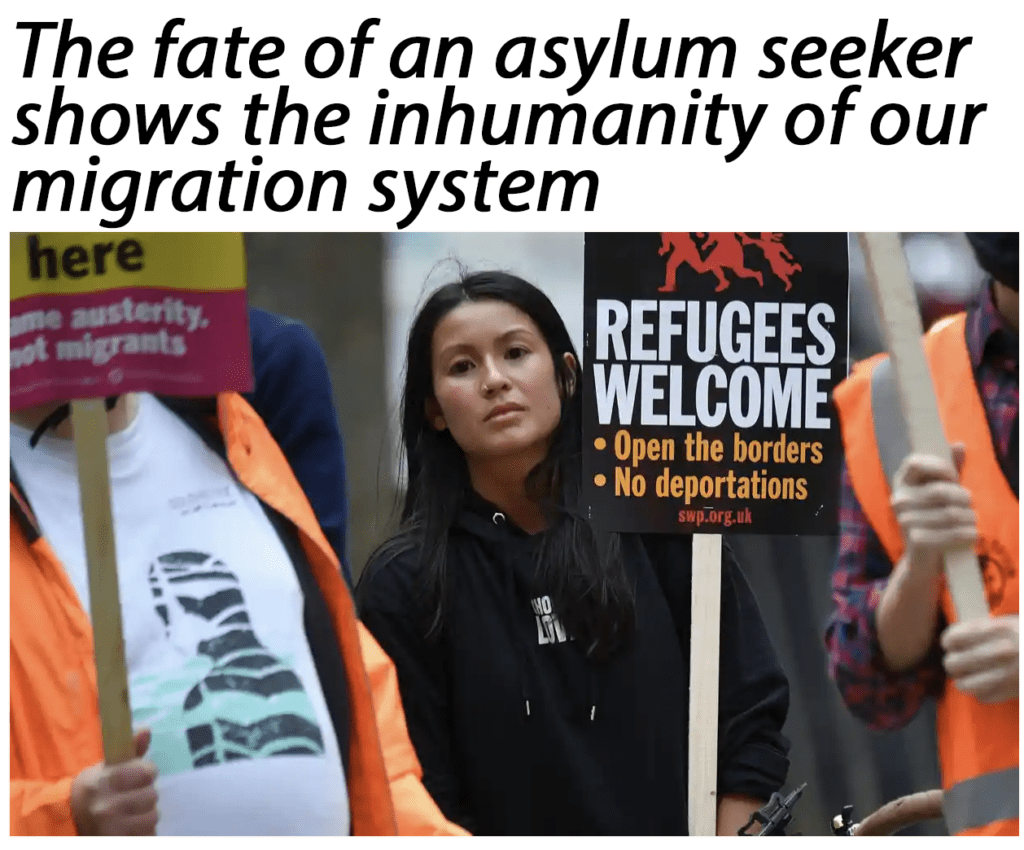The fate of an asylum seeker shows the inhumanity of our migration system
By Claudia Webbe MP
Mercy Baguma’s tragic death should mark a turning point for the Home Office
One would have thought that in the sixth richest country in the world, malnourishment and hunger would be a thing of the past. Yet this week Mercy Baguma, an asylum seeker from Uganda who was living in “extreme poverty”, was found dead next to her malnourished baby in a Glasgow flat. Baguma’s body was only found because of the cries of her child.

This unspeakable, avoidable tragedy is indicative of the inhumanity that is embedded in our immigration system. Frankly, deaths such as these are a stain on our collective soul. While billionaires and big corporations record ever-increasing profits, it is shameful that our people are dying of hunger.
The coronavirus pandemic has caused widespread suffering for too many individuals and communities across the UK. We have the worst of both worlds: in addition to England having the highest number of excess deaths, we are facing our worst ever recession, which is nearly twice the severity of comparable European nations.
While the government’s financial support for businesses and employees has been far from perfect, many of those affected have at least been able to claim some modicum of support to cope with this crisis. Yet this opportunity has not been afforded to some of the most vulnerable people in the UK.
Thousands of UK residents who are undocumented, and those who have no recourse to public funds (NRPF), have already been driven into destitutionduring this crisis. Recent Home Office statistics show that the number of migrants with NRPF who have applied for destitution funds has increased dramatically, by 572% in the months spanning the coronavirus crisis.
This means that nearly 3,000 migrants facing total hardship could be waiting to hear if they and their families will be able to avoid severe poverty. This includes only the limited number of migrants who are aware of the destitution provision – given the “hostile environment” for migrants, many do not know that they are eligible for any state support.
The statistics also revealed that it took the Home Office an average of 30 days to decide on these life-or-death applications. In order to speed up the process and enable families to access emergency support, I have written to the home secretary to urge the Home Office to commit to making these decisions within 24 hours.
It is also appalling that the Home Office does not even record the number of UK residents with NRPF. This is despite a recent intervention from the Office for Statistics Regulation, which expressed alarm at the Home Office’s repeated refusal to do so. It is contrary to reason to develop policy without knowing how many the condition affects – the government must adopt this most basic of tasks.
The furlough and self-employment schemes are also largely inaccessible to those with NRPF, who are often on informal or zero-hour contracts, and these schemes do not provide any support to those who have seen their contracts terminated or hours reduced. Many will already have been in debt before the crisis, owing to the exorbitant visa renewal fees and surcharges, which must be paid every two and a half years.
My constituency of Leicester East is home to many workers with NRPF, for whom it is impossible to survive without attending work – often in unsafe conditions. A significant number of workers in Leicester’s crisis-struck garment industry who have approached me for help have the NRPF condition, are unaware of the small number of benefits that they are able to access, and are employed by unscrupulous firms that have no union recognition and where health and safety measures have not been implemented.
The government’s justification for this cruel policy is that it is “protecting public funds” by preventing vulnerable migrants from accessing basic benefits. Yet they do not exhibit this same frugality when handing out wasteful, multimillion-pound contracts to private companies, or enabling billionaires and large corporations to evade tax.
The tragic irony is that many people with NRPF, who are living in constant fear of the British state, work in frontline services that the government has been at pains to praise during this crisis. The pandemic has shown that the people who really keep our society ticking are not billionaires and the super-rich, but nurses, carers, cleaners, checkout attendants and many more essential frontline workers. We must ensure that all frontline workers are valued and protected as we rebuild our economy and society.
It is vital that we repay this extraordinary contribution with a permanent extension of migrant rights. That means an end to the hostile environment, shutting detention centres and granting indefinite leave to everyone living in the UK.
It also means that the government must ensure that all migrants have automatic access to resources without fear of detention or deportation by permanently abolishing the NRPF provision. Mercy Baguma’s death must be a turning point. In a country of extreme inequality and abundant wealth, we simply cannot allow any of our residents to starve.



